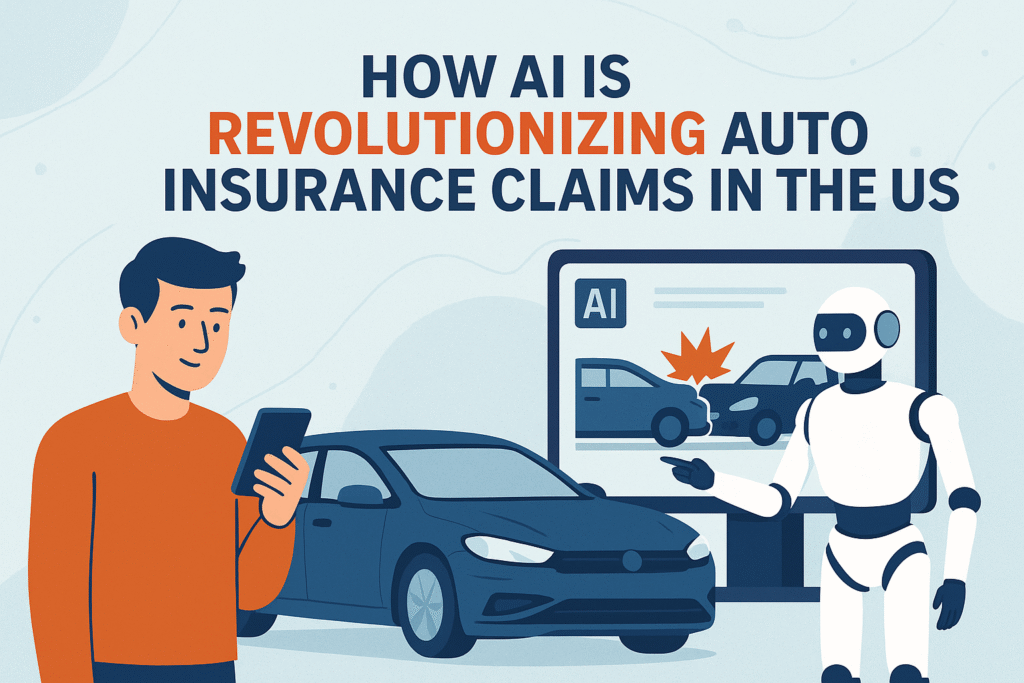The auto insurance industry in the United States is undergoing a digital transformation, and artificial intelligence (AI) is at the heart of it. From speeding up the claims process to detecting fraud and improving customer satisfaction, AI is revolutionizing how insurers handle auto insurance claims.
In a sector traditionally bogged down by paperwork and long wait times, AI is helping insurance companies become faster, smarter, and more efficient — and policyholders are already reaping the benefits.
The Traditional Auto Insurance Claims Process
Before diving into how AI is changing the game, it’s important to understand how auto insurance claims used to work:
- The driver gets into an accident.
- They report the incident to their insurance provider.
- A human claims adjuster inspects the damage.
- The adjuster estimates the repair cost.
- The company processes the claim and issues a payment.
This process could take days or even weeks, depending on the complexity of the case. It also left room for human error and subjective judgment. Now, thanks to AI, insurers can streamline much of this work with greater accuracy and speed.
AI-Powered Claims: What’s New in 2025?
🔍 1. Instant Damage Assessment via Images
One of the most impressive uses of AI in 2025 is image recognition. After an accident, drivers can now upload photos of the damage using their insurer’s app. AI algorithms analyze the images and generate a damage report almost instantly — no need to wait for an in-person inspection.
This technology helps:
- Speed up claim approvals
- Reduce repair shop delays
- Minimize disputes about the extent of the damage
Companies like GEICO, Allstate, and Lemonade have already adopted AI-based image analysis tools, making claims faster and more accurate.
⚙️ 2. Automated Claim Processing
AI doesn’t just assess the damage — it can handle the entire claims lifecycle from start to finish.
Modern insurance platforms use AI to:
- Verify policyholder information
- Cross-check accident details
- Approve or reject claims based on rules
- Trigger payments directly to the customer or repair shop
This automation eliminates long phone calls, manual data entry, and back-and-forth communication — helping insurers process simple claims within minutes.
🧠 3. Fraud Detection and Risk Scoring
Fraudulent claims cost the US insurance industry billions of dollars every year. AI is helping solve this problem with advanced pattern recognition and anomaly detection.
AI can:
- Flag suspicious claims based on inconsistencies
- Compare new claims with past fraud cases
- Score the likelihood of a claim being fraudulent
For example, if someone files multiple similar claims across different states or provides conflicting accident details, AI systems can alert investigators automatically. This not only protects insurers but also helps honest customers get faster service.
🤖 4. AI Chatbots and Virtual Claims Assistants
Customer service is another area being transformed by AI. Insurers now offer AI-powered chatbots that guide customers through the claims process 24/7. These bots:
- Help users report accidents
- Answer common questions
- Collect documents and photos
- Schedule repair appointments
This allows insurers to provide round-the-clock support without long hold times or delays, improving customer experience dramatically.
📈 5. Predictive Analytics for Better Outcomes
AI can also predict how a claim might unfold. Based on historical data, AI models can:
- Estimate the time and cost of repair
- Recommend the best repair shop
- Suggest settlement offers
- Predict claim escalation or litigation risk
These insights help insurers make faster and smarter decisions, reduce unnecessary costs, and provide more transparency to policyholders.
Benefits for Policyholders
Thanks to AI, drivers in the US are seeing real benefits:
- Faster claims processing (often same-day for simple cases)
- Reduced paperwork and human errors
- More accurate damage estimates
- 24/7 virtual assistance
- Greater transparency throughout the process
For consumers, this means less stress, quicker resolutions, and a better overall insurance experience.
What’s Next?
As AI continues to evolve, expect even more innovations in auto insurance claims:
- Voice-based claims filing
- AI-powered accident prevention alerts
- Dynamic policy adjustments based on driving behavior
- Blockchain-backed claim validation
The future is not just faster — it’s smarter and fairer, for both insurers and insured.
Final Thoughts
Artificial intelligence is no longer just a buzzword — it’s actively reshaping the auto insurance industry in the US. By cutting down delays, increasing accuracy, and enhancing fraud protection, AI is making the claims process more efficient than ever before.
For drivers, this revolution means less paperwork and more peace of mind. And for insurers, it means staying competitive in an increasingly digital world.
If you’re shopping for auto insurance in 2025, make sure to choose a provider that leverages AI technology — because the future of claims is already here.


